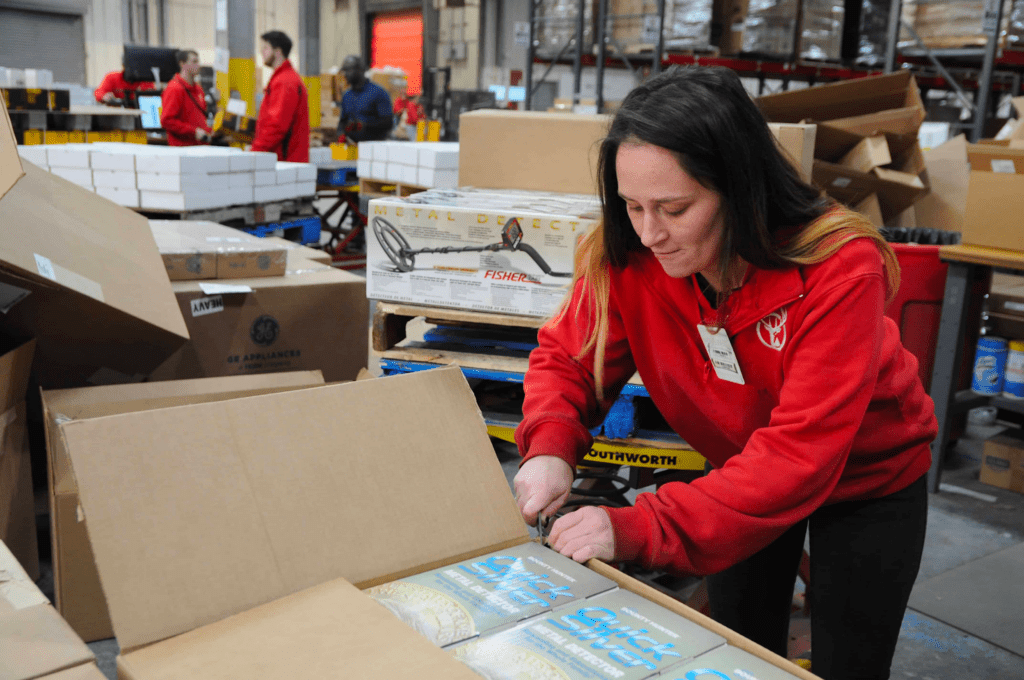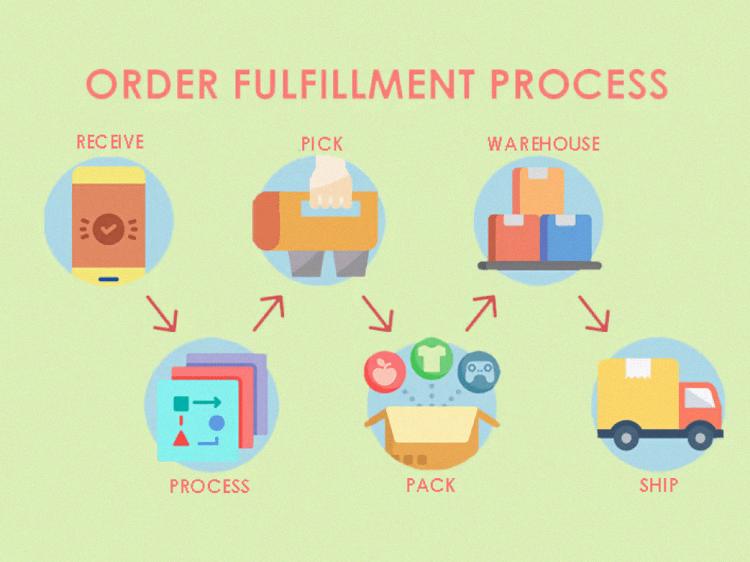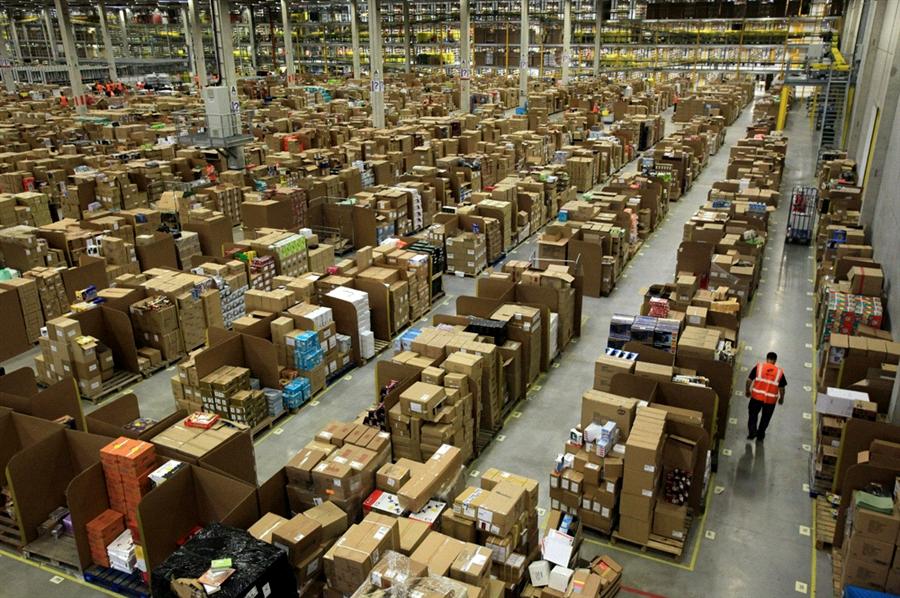Fulfillment specialists are the unsung heroes of warehouses. Without them, warehouses would not be able to function as efficiently as they do today. These individuals are responsible for fulfilling sales orders, which involves receiving orders and ensuring that they are fulfilled quickly and accurately. In this blog post, we will take a closer look at the role of fulfillment specialists, their responsibilities, and what it takes to be successful in this field.
The responsibilities of a fulfillment specialist are diverse and require a great deal of attention to detail. Below are some of the key tasks that a fulfillment specialist typically performs on a daily basis:
1. Receiving Orders: Fulfillment specialists are responsible for receiving orders from customers, either through an online platform or via phone. They must ensure that the orders are accurate and complete.
2. Picking and Packing: Once the order is received, the fulfillment specialist must pick the items from the warehouse shelves and pack them securely for shipment.
3. Shipping: The shipment must be labeled correctly and shipped in a timely manner to ensure that the customer receives their order on time.
4. Inventory Management: Fulfillment specialists must ensure that the warehouse is well-stocked and that inventory is properly managed. This includes monitoring stock levels, conducting periodic inventory counts, and replenishing stock as needed.
5. Quality Control: Fulfillment specialists are responsible for ensuring that the products are of high quality and meet the specifications of the customer.
Skills Required to be a Successful Fulfillment Specialist
To be a successful fulfillment specialist, one must possess a variety of skills. These include:
1. Attention to Detail: Fulfillment specialists must be meticulous in their work and pay close attention to detail to ensure that orders are fulfilled accurately.
2. Physical Stamina: This job requires a lot of physical activity, including walking, lifting, and carrying heavy items. Fulfillment specialists must be in good physical condition to perform these tasks.
3. Time Management: Fulfillment specialists must be able to manage their time effectively to ensure that orders are fulfilled in a timely manner.
4. Communication Skills: Fulfillment specialists must be able to communicate effectively with customers, as well as with other members of the warehouse staff.
5. Problem-Solving Skills: Fulfillment specialists must be able to think critically and solve problems quickly to ensure that orders are fulfilled accurately and efficiently.
Fulfillment specialists are an essential part of the warehouse operations. They are responsible for ensuring that orders are fulfilled quickly and accurately, which requires a great deal of attention to detail and physical stamina. The skills required to be a successful fulfillment specialist include attention to detail, physical stamina, time management, communication skills, and problem-solving skills. If you are considering a career as a fulfillment specialist, these are the key skills that you should focus on developing.
What Does it Mean to be a Fulfillment Expert?
A fulfillment expert is an individual who plays a crucial role in the operations of a warehouse. They are responsible for ensuring that sales orders are fulfilled accurately and efficiently. These professionals work in collaboration with oter team members to receive orders, pick the items from the inventory, pack them, and ship them to the customers.
Fulfillment experts are highly skilled in managing order processing systems and utilizing various technologies to ensure that the order fulfillment process is streamlined. They are also responsible for managing the inventory levels of the warehouse, ensuring that the stock is readily available to fulfill orders.
In addition to fulfilling sales orders, fulfillment experts also handle other tasks such as managing returns and exchanges, handling customer inquiries, and generating reports on order fulfillment metrics. They are knowledgeable in warehouse safety procedures and ensure that the warehouse is organized and clean.
To sum up, a fulfillment expert is an essential member of the warehouse team who is responsible for ensuring that sales orders are fulfilled accurately and efficiently. They are highly skilled in order processing systems, inventory management, and customer service.

What Does it Mean to be a Fulfillment Expert at Target?
Fulfillment experts at Target play a crucial role in ensuring that products are delivered to guests safely, efficiently and effectively. These professionals are responsible for picking, sorting, prepping and packing products based on the orders received from guests.
The job of a fulfillment expert involves working in a fast-paced environment, where attention to detail and quick problem-solving skills are required. They are responsible for ensuring that the products are of high quality, and that they are packaged in a way that ensures they reach thir destination in perfect condition.
Fulfillment experts must also ensure that they meet all the safety regulations and guidelines set by the company, as well as any applicable laws and regulations. They must be able to work well under pressure, and be able to adapt to changing circumstances quickly.
Some of the key tasks that fulfillment experts at Target may be responsible for include:
– Picking products from the shelves and storage areas based on the orders received
– Sorting and organizing the products based on their destination
– Prepping the products by scanning, labeling and packaging them appropriately
– Packing the products in boxes or other containers, ensuring that they are properly protected
– Loading the products onto delivery trucks or other transportation vehicles
The job of a fulfillment expert at Target is crucial in ensuring that guests receive their products in a timely and efficient manner. These professionals must be highly skilled, attentive to detail and able to work well in a fast-paced environment.
The Difficulty of Fulfillment at Target
Fulfillment at Target can be physically demanding, but the job tasks themselves are not overly complicated. The main responsibility of the fulfillment department is to pick and pack items for online orders. This involves walking through the store to locate items, scanning them, and placing them in a bin or box for shipment.
Expect to spend the majority of your shift on your feet, as there is a lot of walking involved. On average, a fulfillment worker at Target can easily walk 10 or more miles during an eight-hour shift. This can be tiring, especially if you are not used to beng on your feet for extended periods.
In addition to walking, there may be some heavy lifting involved in the job. You will need to be able to lift and carry boxes or bins of items, which can weigh up to 50 pounds. However, the lifting is not constant, and there are often breaks in between tasks to rest and recover.
The fulfillment job at Target can be physically demanding, but the tasks themselves are not overly complicated. As long as you are able to handle the physical demands of the job, it can be a great opportunity for those looking for a fast-paced and active work environment.
The Role of a Fulfillment Officer
A fulfillment officer is an essential member of any event planning team. Their primary responsibility is to ensure that all aspects of an event run smoothly and that all participants’ needs are met. This includes coordinating event logistics such as venue selection, catering, transportation, and accommodation for attendees.
One of the most critical tasks of a fulfillment officer is to develop and manage event budgets. This involves creating a comprehensive budget plan that includes all expenses related to the event, such as venue rental fees, equipment rentals, and staffing costs. The fulfillment officer must ensure that the event stays within budget and that all expenses are accounted for.
Another key responsibility of a fulfillment officer is to support participant registration. This involves coordinating the registration process, collecting registrations, and ensuring that all participants receive the necessary information about the event, such as schedules and instructions.
In addition to participant registration, the fulfillment officer is responsible for sponsorship recognition. This involves working with sponsors to ensure that their logos and branding are prominently displayed at the event and that they receive the recognition they deserve for their support.
A fulfillment officer is responsible for in-event fundraising initiatives. This involves coordinating fundraising activities duing the event, such as auctions, raffles, and donation drives. The fulfillment officer must ensure that all funds raised are appropriately accounted for and that all donors receive the necessary tax receipts and acknowledgments.
To sum up, a fulfillment officer is a crucial member of any event planning team. They are responsible for coordinating all aspects of an event, including logistics, registration, sponsorship recognition, and fundraising. They must have excellent organizational skills, attention to detail, and the ability to work well under pressure to ensure that events run smoothly and that all participants have a positive experience.
The Difficulty of Order Fulfillment
Order fulfillment is a demanding job that requires individuals to manage varous tasks related to the shipping and receiving of products. It involves coordinating with suppliers, processing orders, packaging products, and shipping them to customers. The job can be physically demanding, requiring individuals to lift heavy packages and stand for long periods.
To be successful in order fulfillment, individuals need to have strong organizational skills and attention to detail. They must be able to manage multiple tasks simultaneously, prioritize their workload, and ensure that orders are processed accurately and efficiently.
In addition to these skills, order fulfillment associates also need to have good communication skills. They must be able to work closely with other members of the team, including suppliers, shippers, and customer service representatives, to ensure that orders are delivered on time and to the correct destination.
Order fulfillment is a challenging job that requires a combination of physical and mental skills. However, with the right training, experience, and work ethic, individuals can succeed in this field and help ensure that customers receive the products they need in a timely and efficient manner.

Source: jobget.com
The Job of Fulfillment
Fulfillment is a job role in the warehousing and logistics industry, which involves varios tasks related to the movement and processing of goods. It is an entry-level position that requires minimal experience or training, making it an excellent starting point for individuals seeking to build a career in this field.
Fulfillment associates are responsible for ensuring the smooth operation of the warehouse by performing a range of duties, including unloading merchandise trucks, deciphering work orders, locating stock, and packing items for shipment. They work under the supervision of the Warehouse Manager and assist in the day-to-day functioning of the warehouse.
Some of the key responsibilities of a fulfillment associate include:
1. Receiving incoming goods: Fulfillment associates are responsible for unloading, unpacking, and verifying the accuracy of incoming merchandise. They inspect the items for damage and check the quantity and quality of the products received.
2. Inventory management: Fulfillment associates are responsible for maintaining the warehouse inventory by keeping track of the items received, stored, and shipped. They use various tools and software to manage the inventory and ensure that the stock is accurate and up-to-date.
3. Order processing: Fulfillment associates are responsible for processing customer orders, picking the items from the warehouse, packing them, and preparing them for shipment. They use handheld scanners and other tools to scan the items and ensure that the orders are accurate and complete.
4. Quality control: Fulfillment associates are responsible for maintaining the quality of the products by inspecting them for defects and ensuring that they meet the quality standards set by the company.
Fulfillment is a job role that involves various tasks related to the movement and processing of goods in a warehouse. Fulfillment associates play a critical role in ensuring the smooth functioning of the warehouse and are responsible for tasks such as receiving incoming goods, inventory management, order processing, and quality control.
Highest Position at Target
Target is a well-known retail company in the United States that offers a wide range of products and services to its customers. The company has various positions for employees, and each position has its own set of responsibilities and requirements. If you are interested in working at Target and want to know what the highest position is, then you have come to the rigt place.
The highest position at Target is the Store Manager. Store Managers are responsible for overseeing the daily operations of the store, managing the staff, ensuring customer satisfaction, and meeting sales goals. They are also responsible for hiring and training new employees, creating schedules, managing inventory, and ensuring the store is clean and well-maintained.
To become a Store Manager at Target, you will need to have a minimum of three years of retail management experience. You will also need to have strong leadership skills, excellent communication skills, and the ability to multitask. A bachelor’s degree in business administration, marketing, or a related field is preferred but not required.
In addition to the Store Manager position, Target also offers other high-paying positions such as Senior Engineer, Protection Specialist, and Stock Unloader. These positions require specific skills and experience, but they offer competitive salaries and benefits.

Source: lab916.com
Improving Fulfillment Performance
Fulfillment efficiency is a critical aspect of any business that offers products and services to customers. It involves the process of receiving, processing, and delivering orders to customers. Improving your fulfillment efficiency can help you meet customer expectations, reduce costs, and increase profits. Here are nine tips to help you get better at fulfillment:
1. Focus on inventory accuracy: A common cause of inefficient fulfillment is inaccurate inventory records. To improve accuracy, implement an inventory management system that tracks inventory levels in real-time.
2. Make your order fulfillment process predictable: Create a standard operating procedure for order fulfillment that outlines each step of the process. This will help ensure that orders are processed consistently and predictably.
3. Optimize warehouse layout: Organize your warehouse to maximize space and minimize the time it takes to pick and pack orders. Place popular items closer to the packing and shipping areas to reduce pick times.
4. Streamline order picking: Implement a system that makes it easy for pickers to find and select items for orders quickly. This might include barcode scanning or voice-activated picking.
5. Optimize slotting: Slotting involves organizing inventory in a way that minimizes the time it takes to pick orders. Analyze your sales data to identify which items are popular and place them in easily accessible locations.
6. Reduce touches and handling: Every time an item is handled, it increases the risk of damage and slows down the fulfillment process. Minimize the number of times an item is touched by optimizing your warehouse layout and pick paths.
7. Outsource order fulfillment to a 3PL: If you don’t have the resources to manage fulfillment in-house, consider outsourcing to a third-party logistics provider (3PL). 3PLs specialize in order fulfillment and can help you improve efficiency and reduce costs.
8. Utilize an RFID system: RFID (Radio Frequency Identification) technology can help you track inventory levels and automate the fulfillment process. RFID tags can be attached to items, allowing them to be scanned and tracked automatically.
9. Continuously monitor and improve: Regularly review your fulfillment process to identify areas for improvement. Collect data on order processing times, accuracy rates, and other metrics to track performance over time. Use this data to make informed decisions aout how to improve your fulfillment efficiency.
The Role of Fulfillment in Business
Fulfillment is an essential part of the supply chain process, which involves receiving, processing, and delivering customer orders. As a Fulfillment Associate, your primary responsibility is to ensure that orders are processed quickly and efficiently to meet customer demands. Here is a detailed breakdown of what you do in fulfillment:
1. Receiving orders: You receive orders from customers via various channels, including phone, email, or e-commerce platforms.
2. Offloading stock deliveries: Once the orders are received, you work with the warehouse team to offload stock deliveries from trucks and transport them to the warehouse.
3. Processing work orders: You process work orders based on the products ordered, which involves retrieving the items from the warehouse, verifying their quality, and preparing them for shipment.
4. Packaging orders for distribution: You package the orders for distribution, ensuring that they are correctly labeled and packaged securely to prevent damage during transit.
5. Organizing inventory: You work with the warehouse team to organize the inventory, ensuring that the products are stored appropriately and that there is sufficient stock to fulfill customer orders.
6. Shipping and tracking orders: You arrange for the shipment of orders, working with third-party logistics providers or shipping companies to ensure that the orders are delivered on time. You also track the orders to ensure that they are delivered to the correct location.
7. Customer service: You may also be responsible for providing customer service, answering customer inquiries, and resolving any issues rlated to order fulfillment.
A Fulfillment Associate plays a critical role in ensuring that customer orders are processed quickly and efficiently, from receiving the order to delivering the product. By working with the warehouse team and logistics partners, you ensure that orders are fulfilled accurately and on time, resulting in satisfied customers and a successful business.

Source: cmorgan.com
The Role of Fulfillment at Amazon
Fulfillment by Amazon (FBA) is a service offered by Amazon that allows sellers to outsource shipping and order fulfillment to Amazon. With this service, Amazon takes care of the entire fulfillment process, from storing the products in their warehouses to picking, packing, and shipping the orders to customers.
Here’s a breakdown of what the fulfillment process at Amazon entails:
1. Storage – Amazon stores the seller’s products in their warehouses, which are strategically located around the world to ensure quick and efficient delivery.
2. Order Placement – When a customer places an order for a product on Amazon, the seller’s inventory is automatically updated, and Amazon is notified of the order.
3. Picking – Amazon employees then pick the product from the warehouse, ensuring that the right item is selected.
4. Packing – The product is then packaged in a secure manner to avoid damage during transport.
5. Shipping – Amazon ships the product to the customer via the chosen delivery method, such as standard or expedited shipping.
6. Delivery – The product is delivered to the customer, and Amazon provides tracking infomation so the customer can monitor the delivery status.
Amazon’s fulfillment service takes care of the entire order fulfillment process, allowing sellers to focus on other aspects of their business. This service allows for efficient and reliable delivery to customers, which can help sellers increase their sales and customer satisfaction.
What Are the Responsibilities of an Amazon Fulfillment Worker?
Amazon is one of the largest online retailers in the world, and their success is largely due to their efficient and effective fulfillment process. Fulfillment workers are essential to ensuring that customers receive their orders on time and in good condition. So, what exctly does a fulfillment worker do at Amazon?
One of the main responsibilities of a fulfillment worker is to select, pack, and ship orders. This involves navigating through a vast warehouse or distribution center to locate the items that customers have ordered. Fulfillment workers may use handheld scanners or other tools to help them find the correct items quickly and efficiently.
Once the items have been located, the fulfillment worker is responsible for packing them up in a way that ensures they will arrive at their destination in good condition. This may involve using special packaging materials, such as bubble wrap or foam inserts, to protect fragile or delicate items.
In addition to selecting, packing, and shipping orders, fulfillment workers may also be responsible for receiving and putting away inventory. This involves unpacking shipments from suppliers and organizing the items in the warehouse so that they can be easily located when customers place orders.
Fulfillment workers may also be responsible for other tasks, such as processing returns, maintaining inventory records, and helping to keep the warehouse clean and organized.
It’s worth noting that Amazon has a variety of fulfillment centers across the world, and the specific responsibilities of a fulfillment worker may vary depending on the location and the type of products being sold. For example, some fulfillment centers may specialize in perishable goods, while others may focus on electronics or other types of merchandise.
Though, the role of a fulfillment worker at Amazon is critical to the company’s success. By ensuring that orders are processed quickly and accurately, these workers play a key role in keeping customers happy and coming back for more.
Conclusion
Fulfillment specialists are an integral part of warehouse operations. They play a crucial role in ensuring that sales orders are fulfilled in a timely and efficient manner. From receiving orders to picking, sorting, prepping, and packing products, fulfillment specialists are responsible for ensuring that customers receive their orders accurately and safely.
One of the key skills that a fulfillment specialist must possess is attention to detail. They must be able to accurately pick and pack products, ensuring that the correct products are shipped out and that they are packaged safely to prevent any damage during transit. Fulfillment specialists must also be able to work quickly and efficiently, as they are often required to fulfill a large number of orders in a short amount of time.
Another important aspect of the role of a fulfillment specialist is the ability to work well in a team. They must be able to communicate effectively with other members of the fulfillment team, as well as with other departments wthin the warehouse. This requires strong interpersonal skills and the ability to work collaboratively to achieve common goals.
Fulfillment specialists are an essential part of any warehouse operation. They play a vital role in ensuring that customers receive their orders accurately and safely, and they must possess a range of skills, including attention to detail, efficiency, and strong interpersonal skills. By working closely with other members of the fulfillment team, as well as with other departments within the warehouse, fulfillment specialists help to ensure that warehouse operations run smoothly and efficiently.
